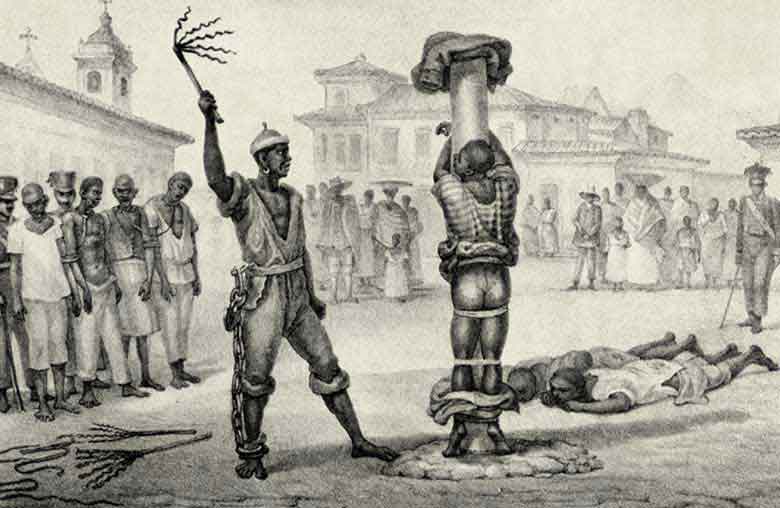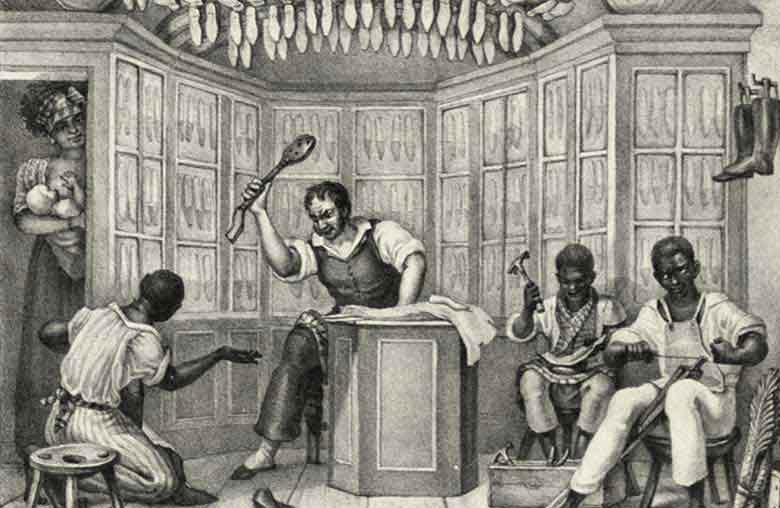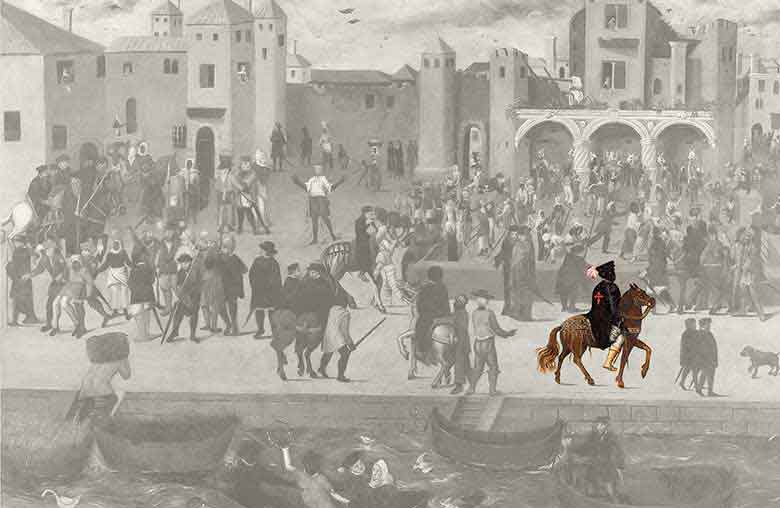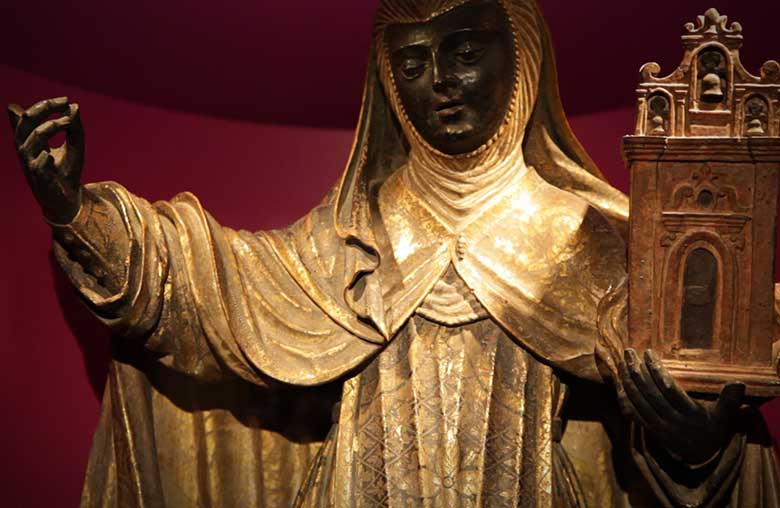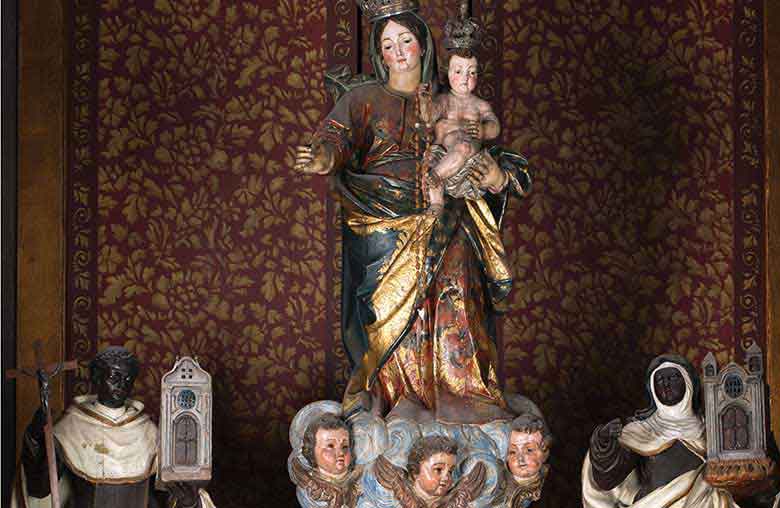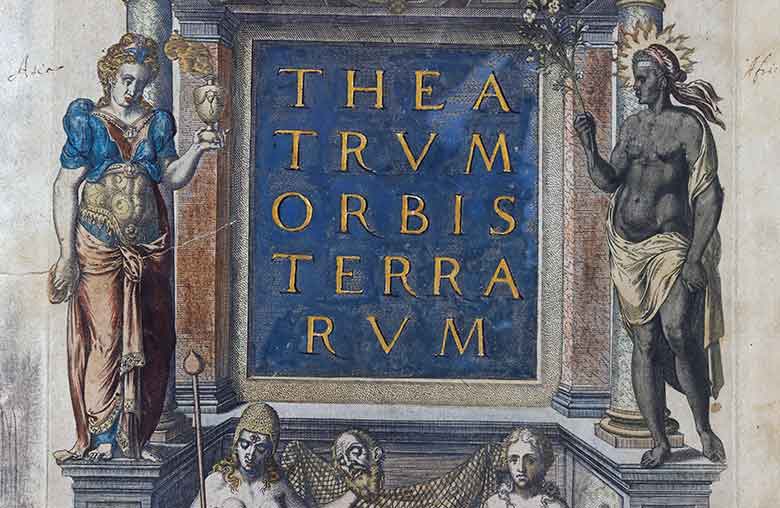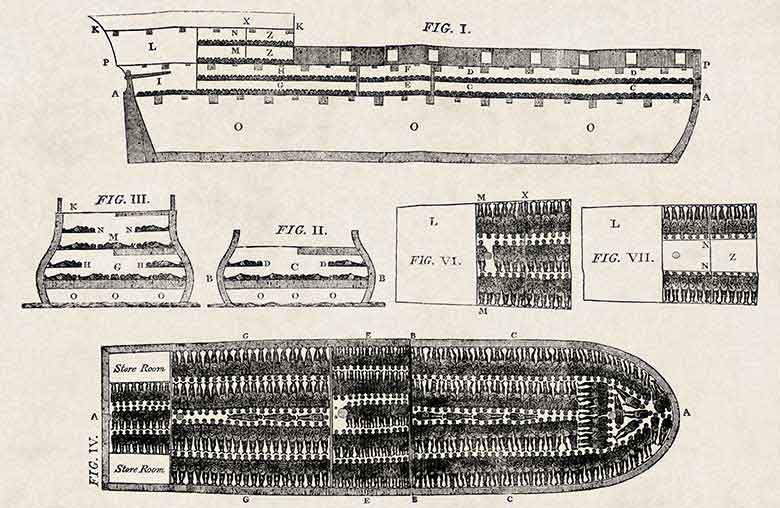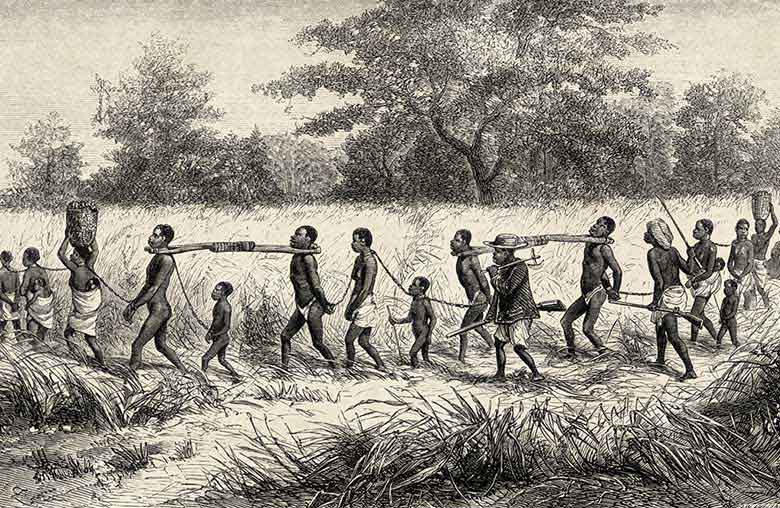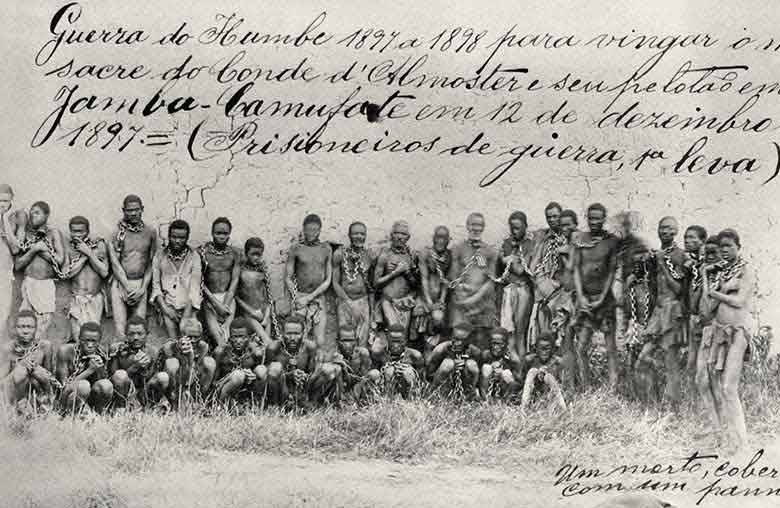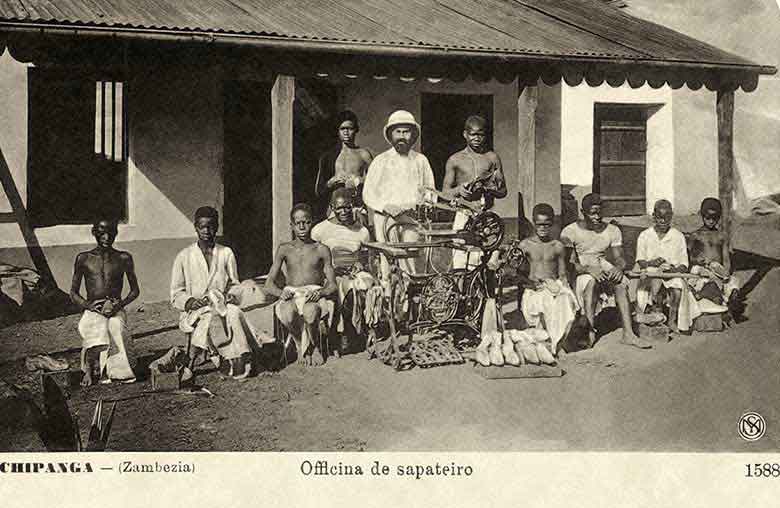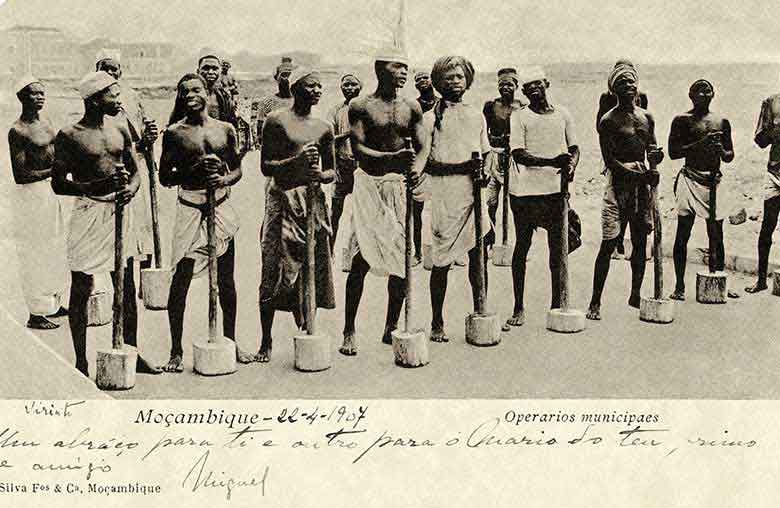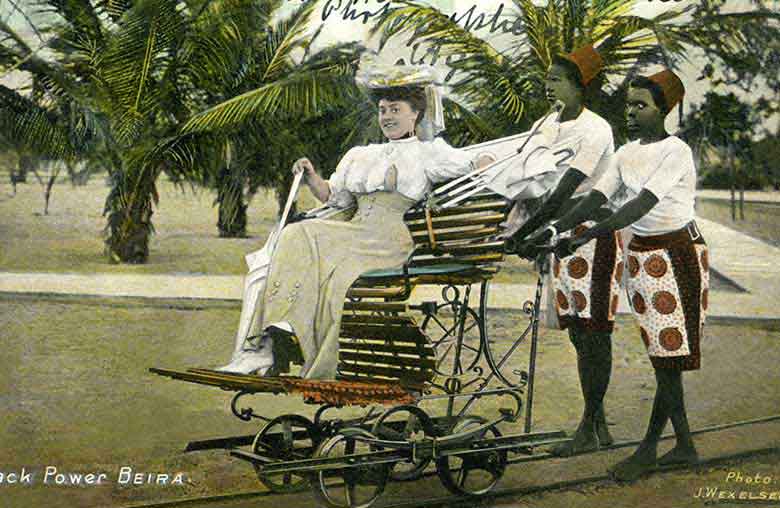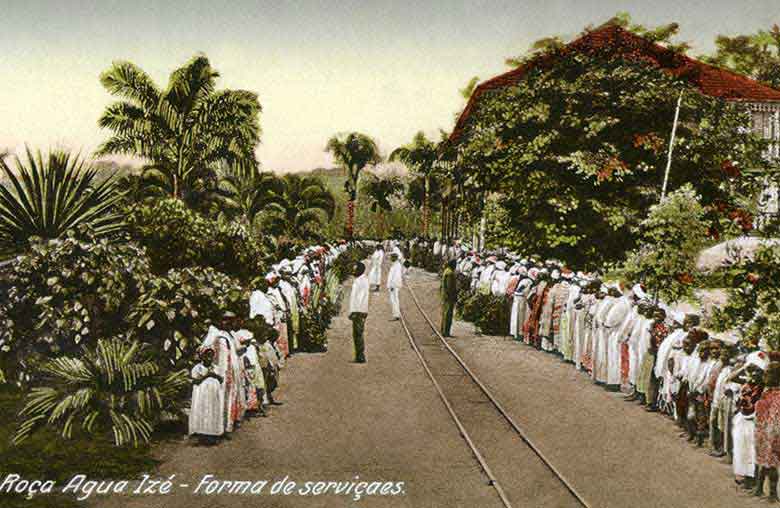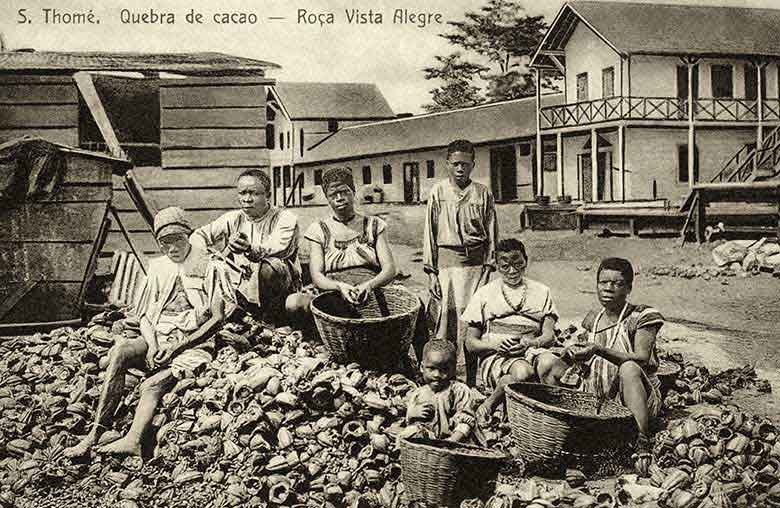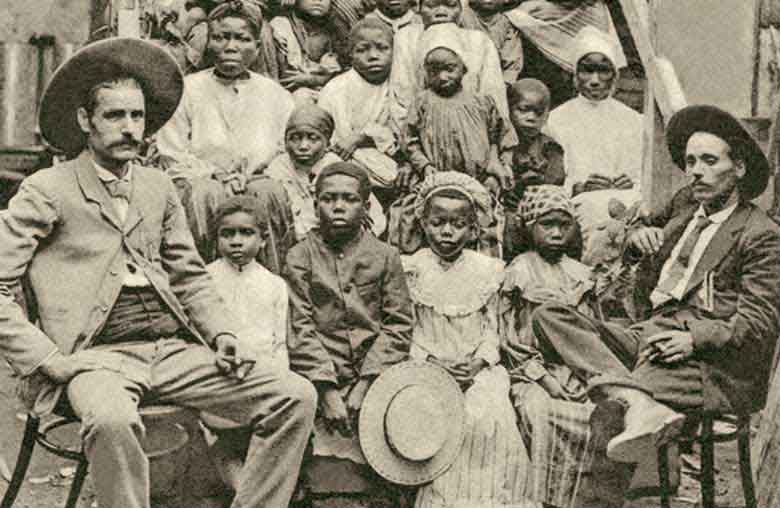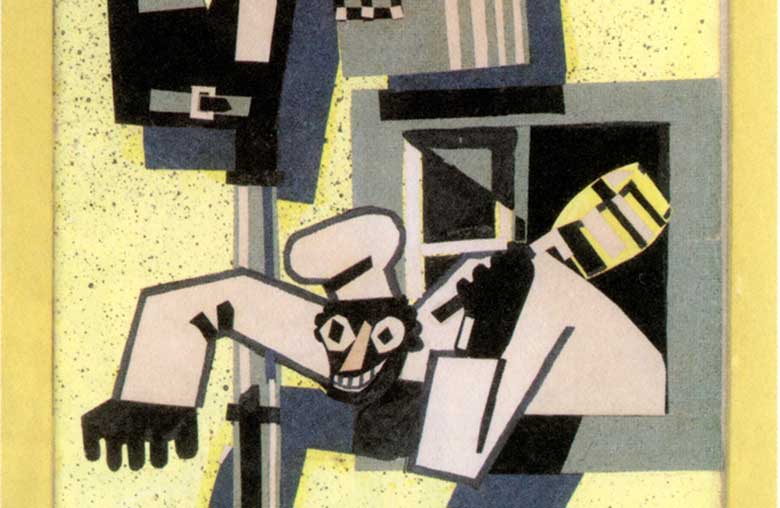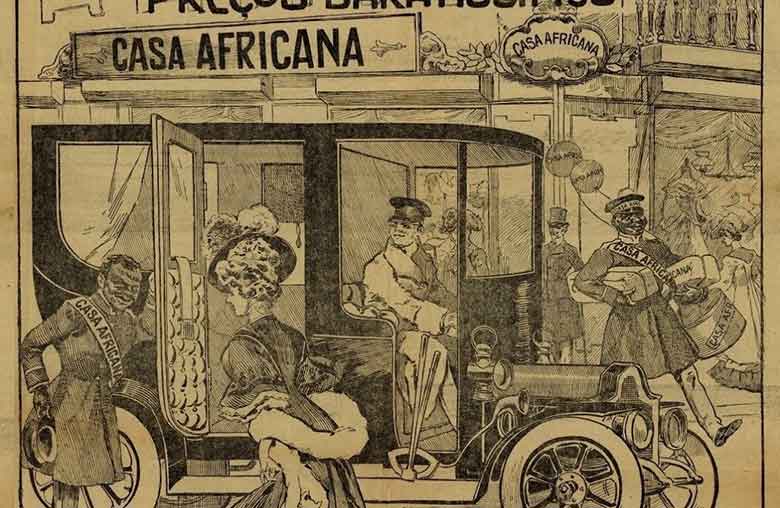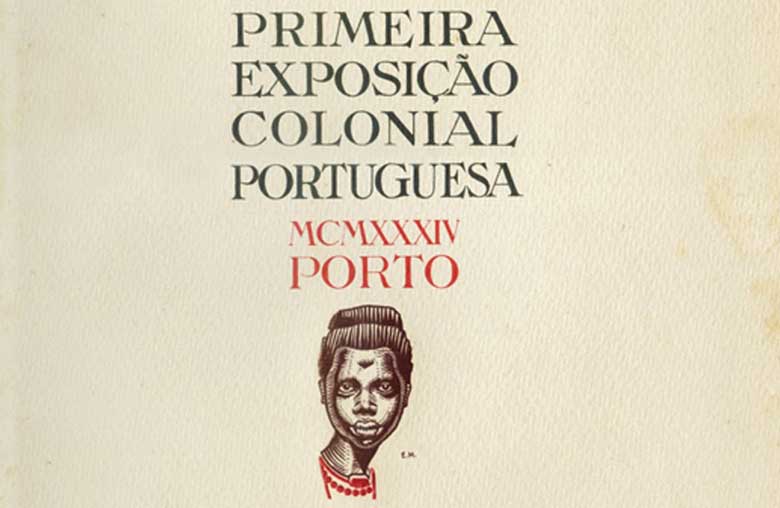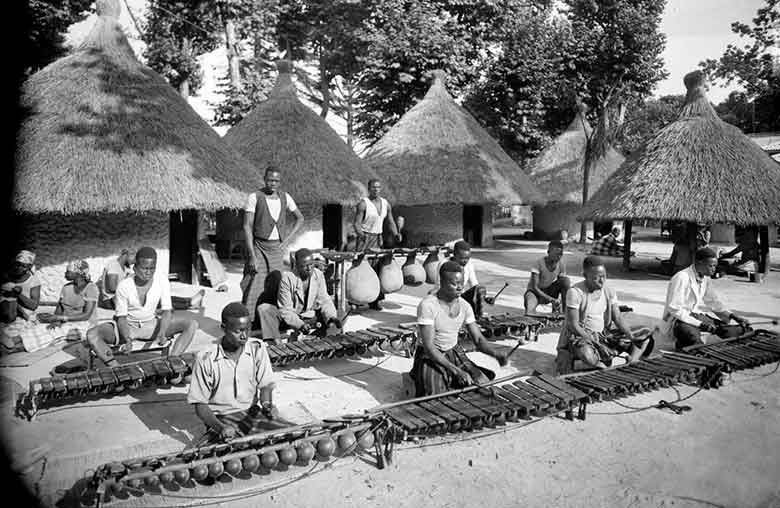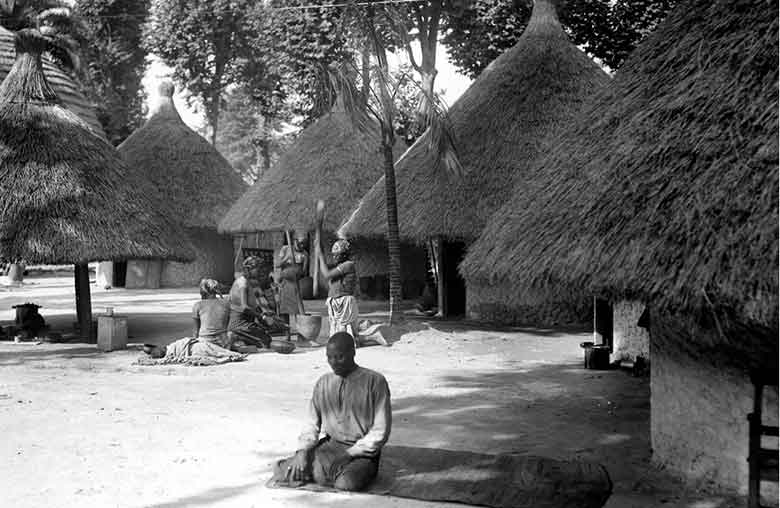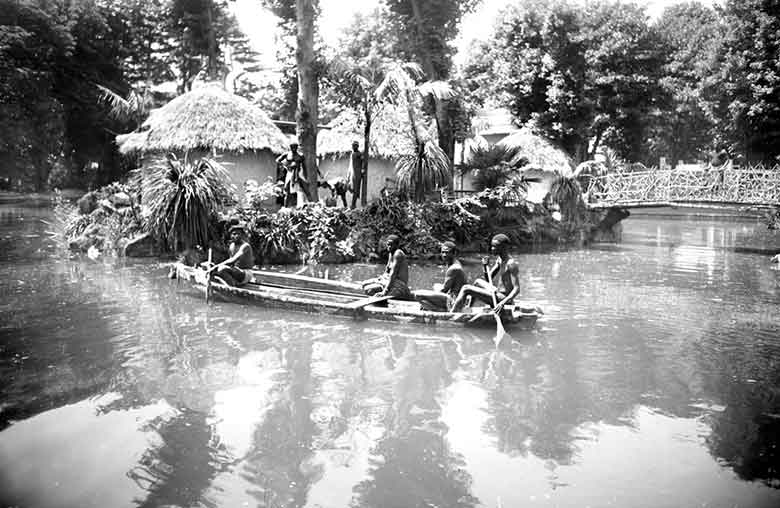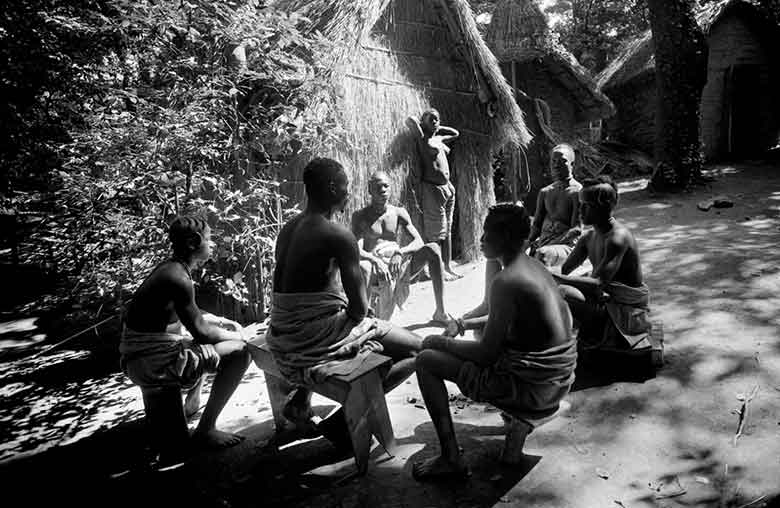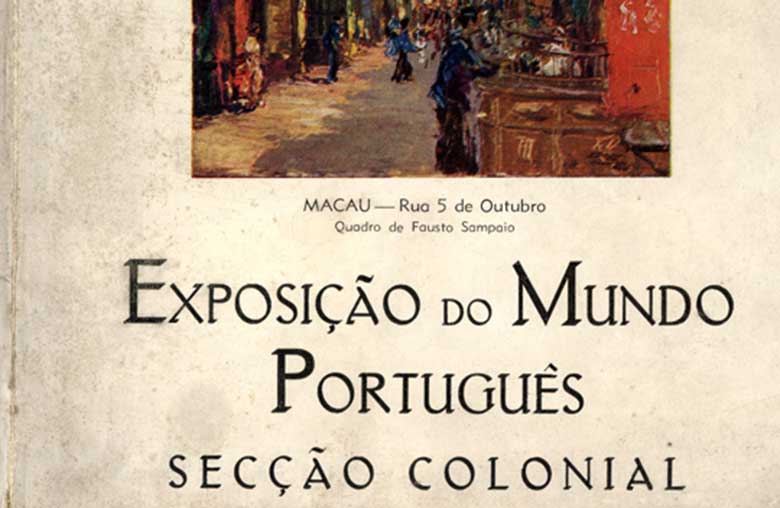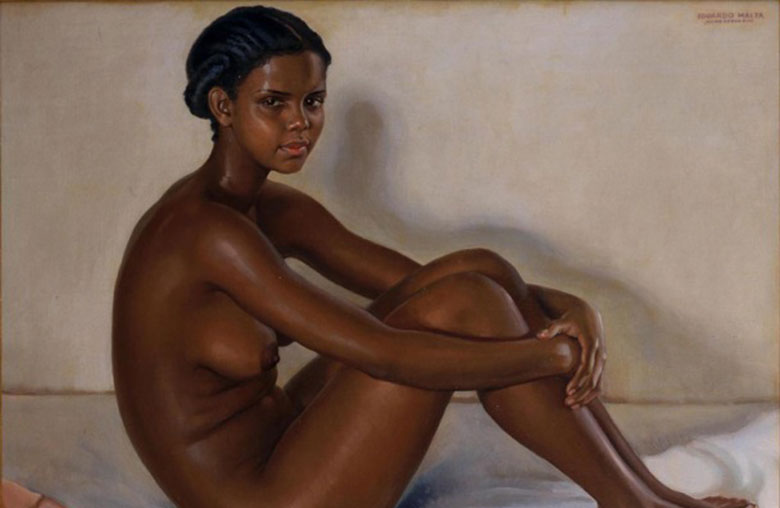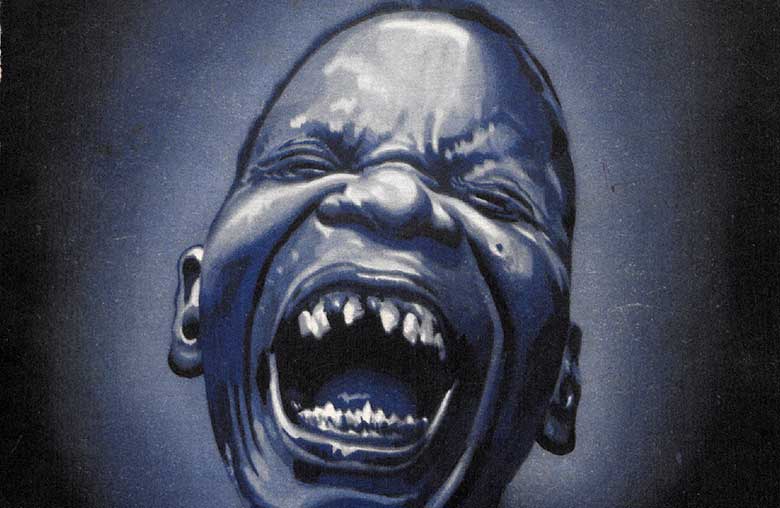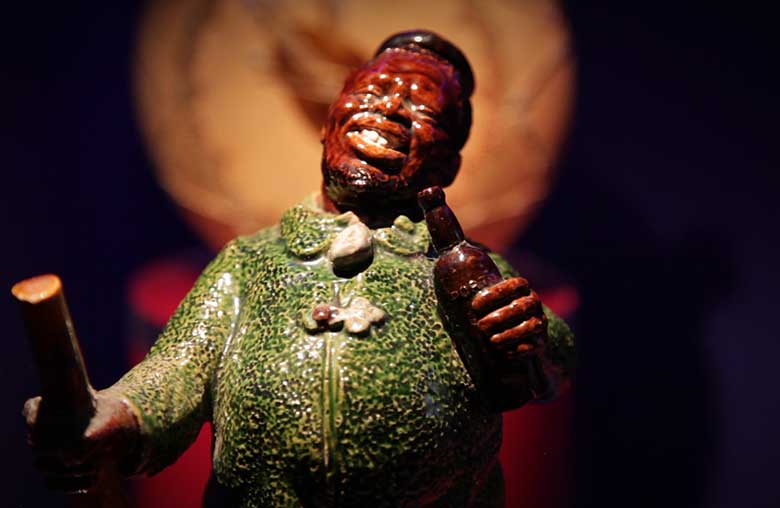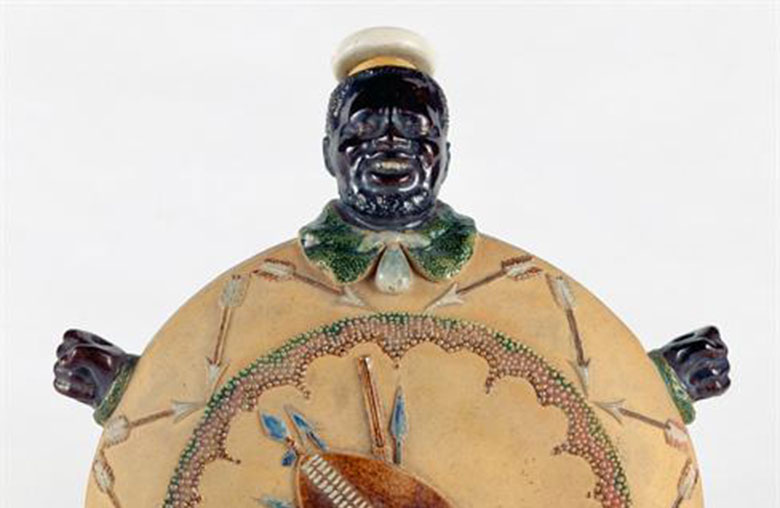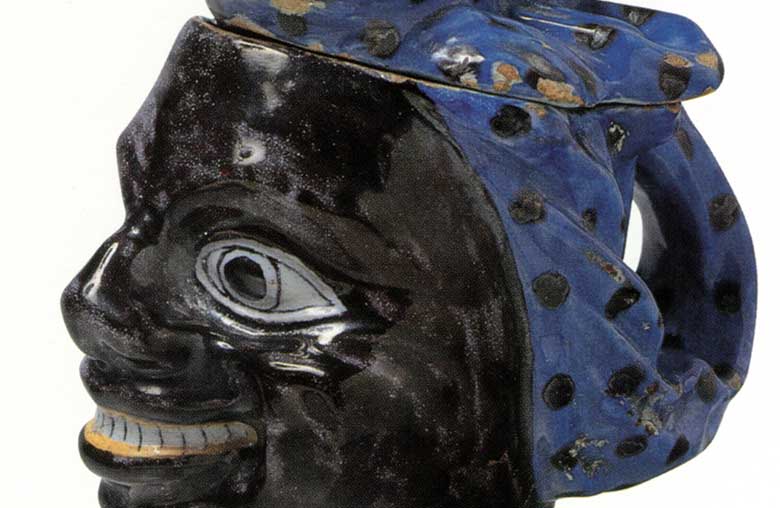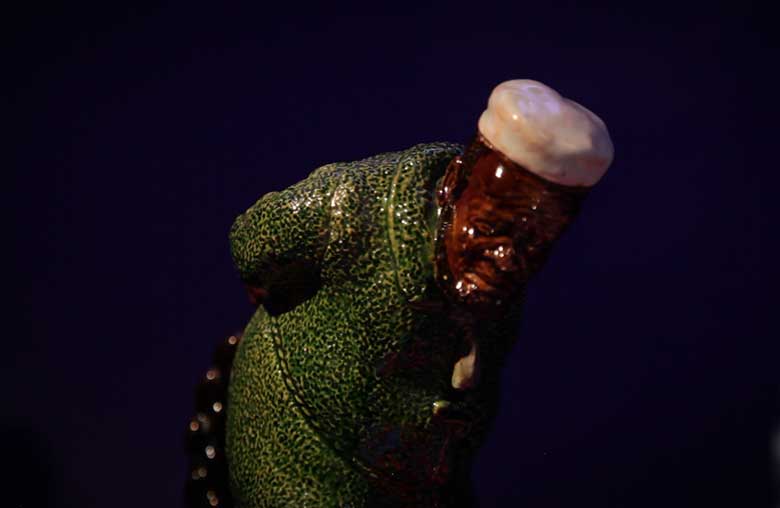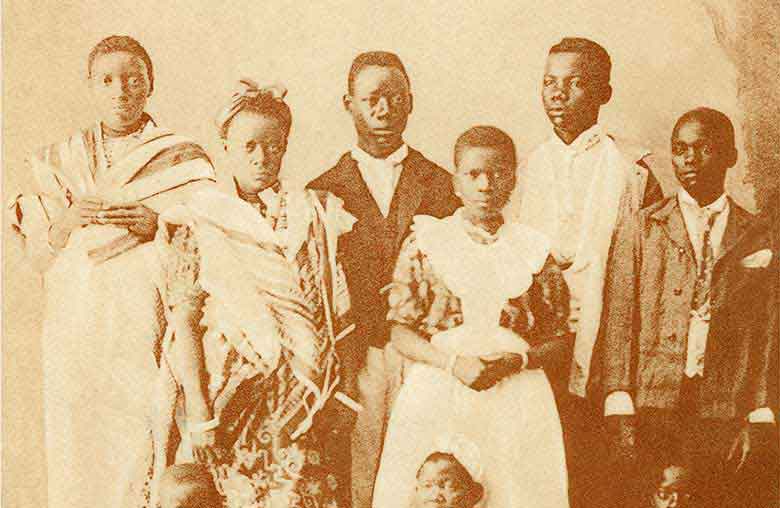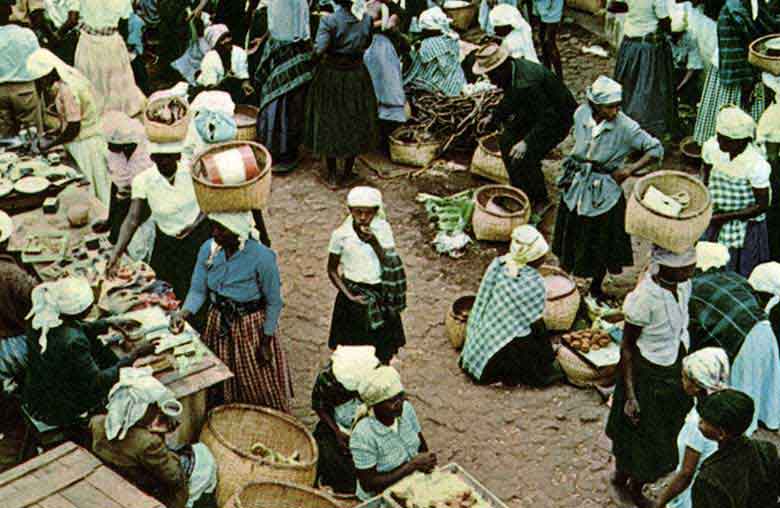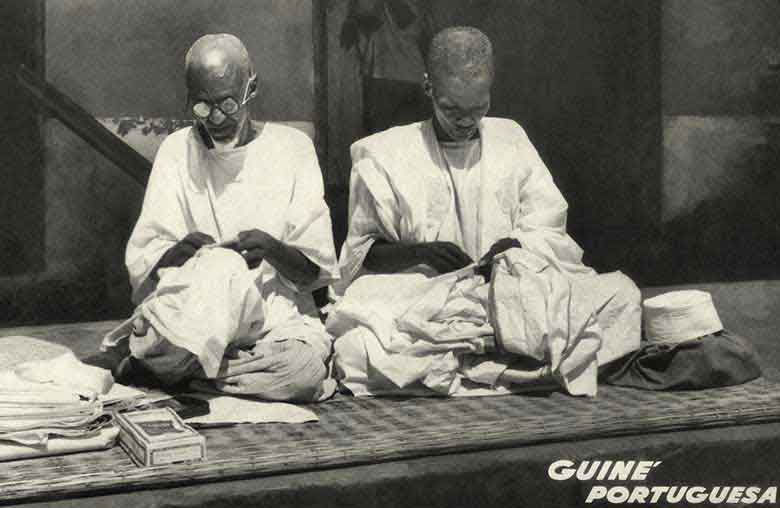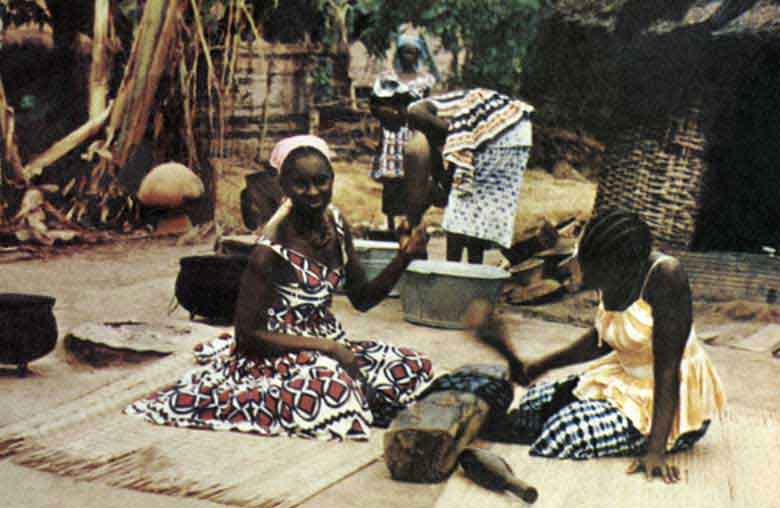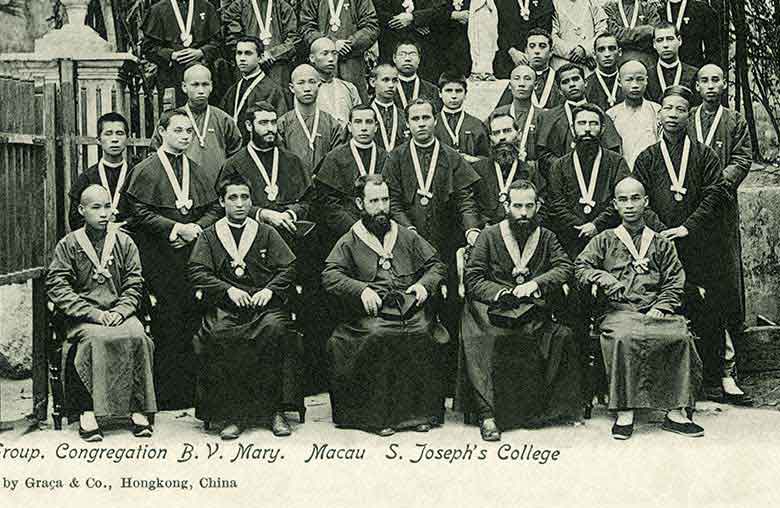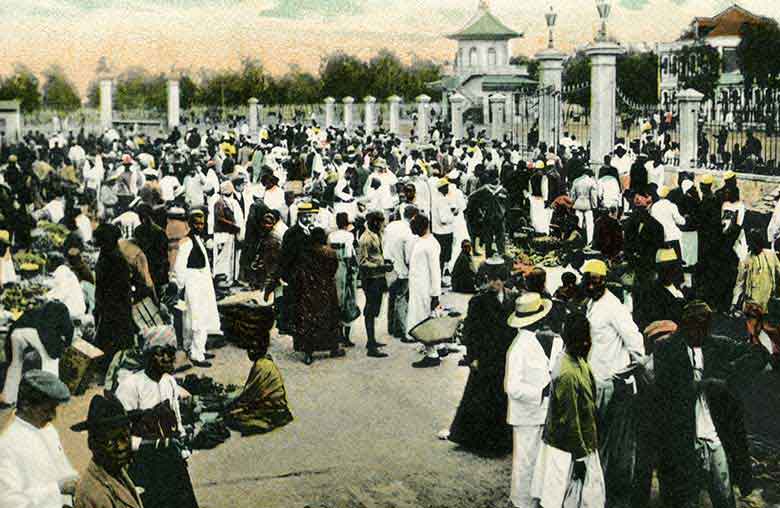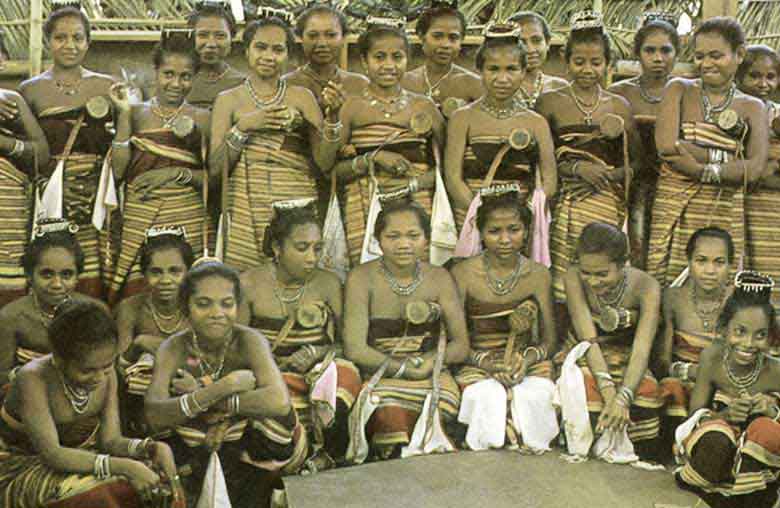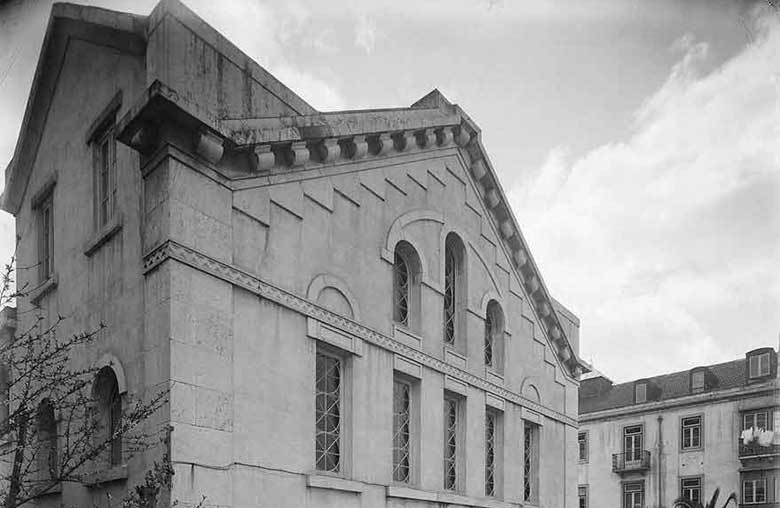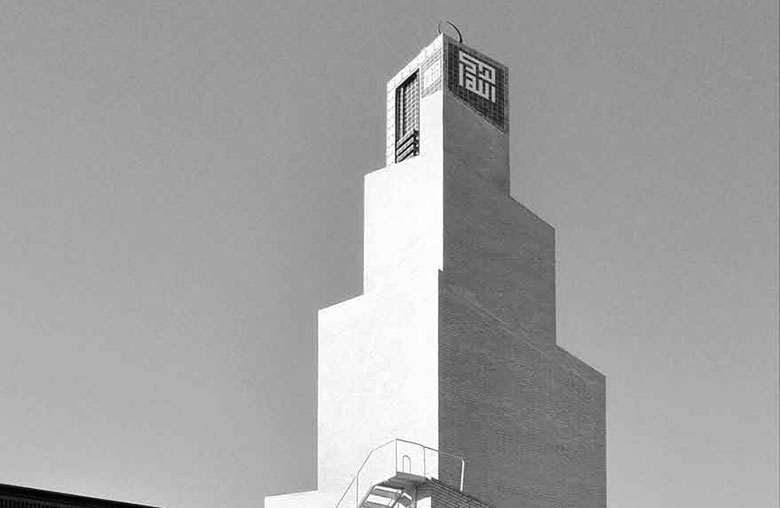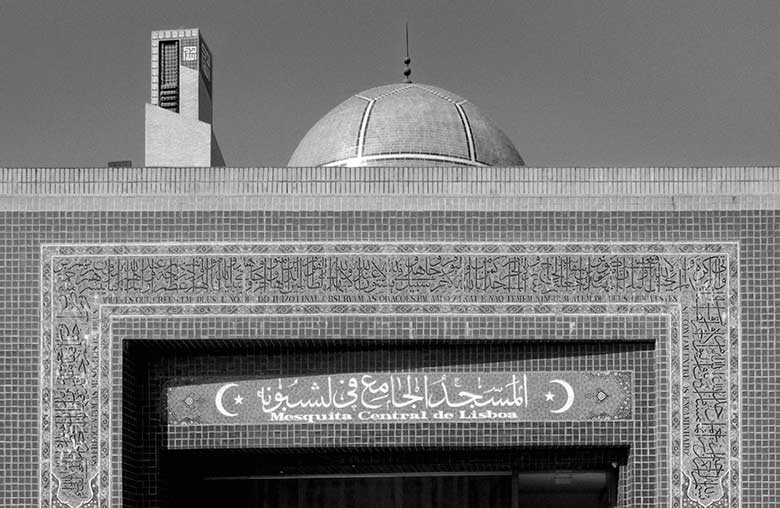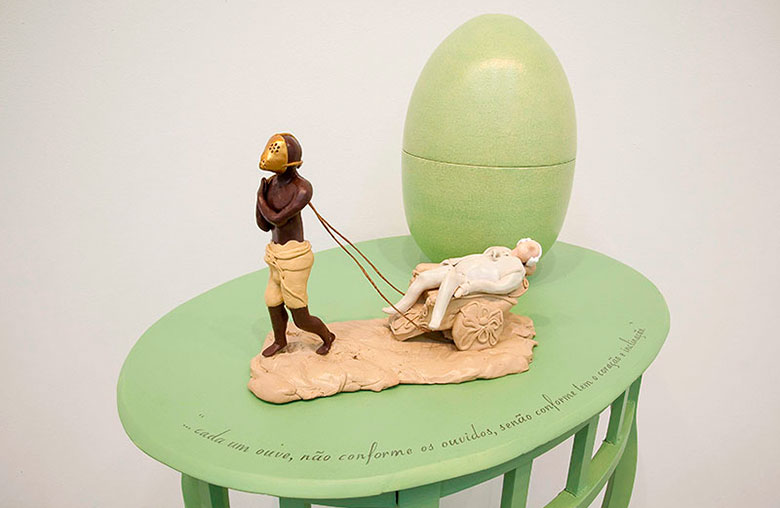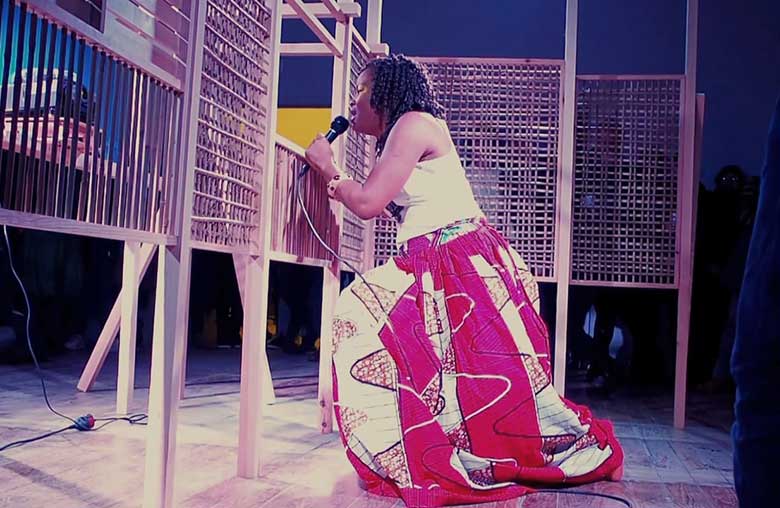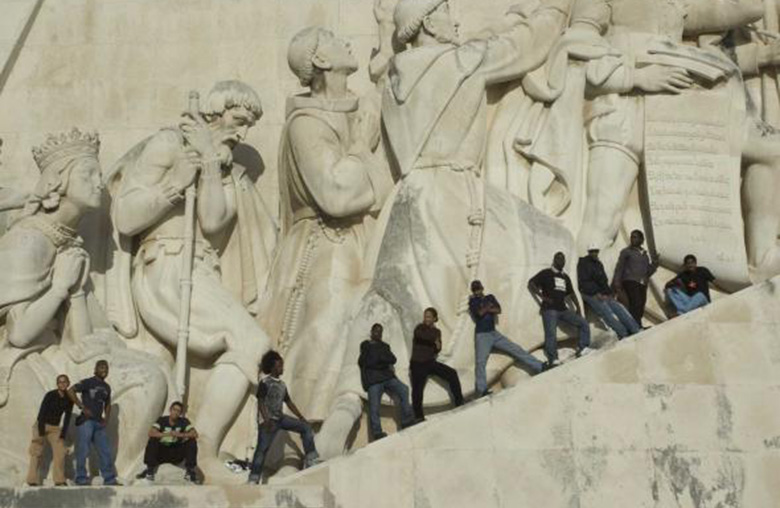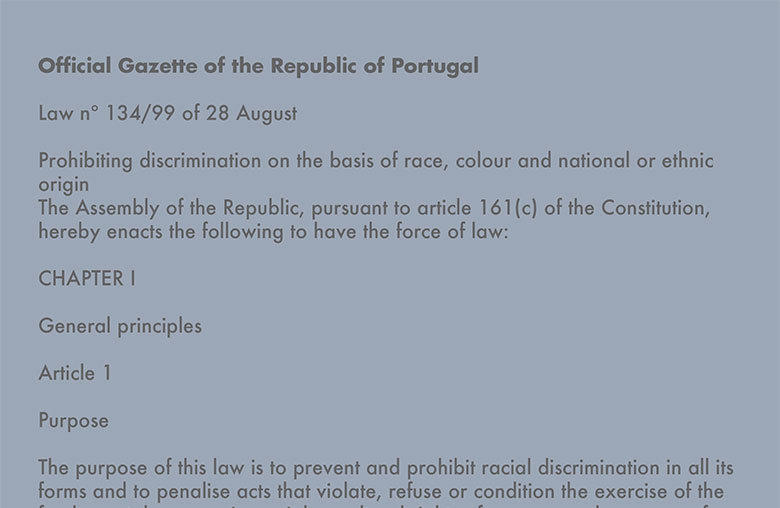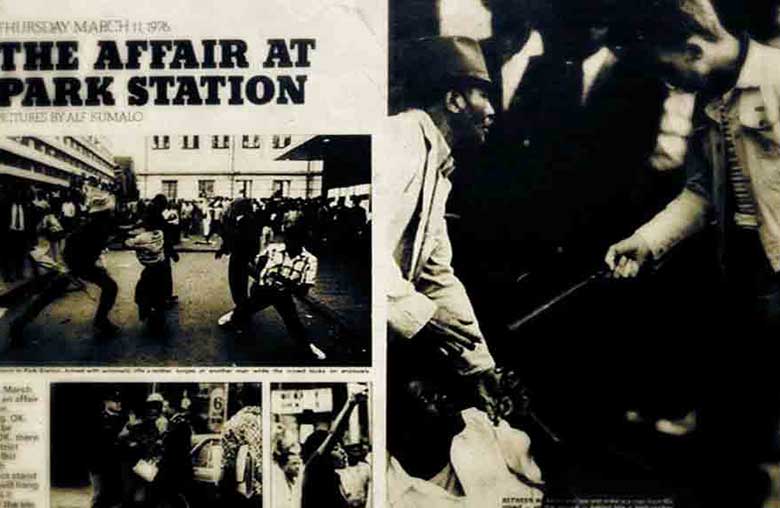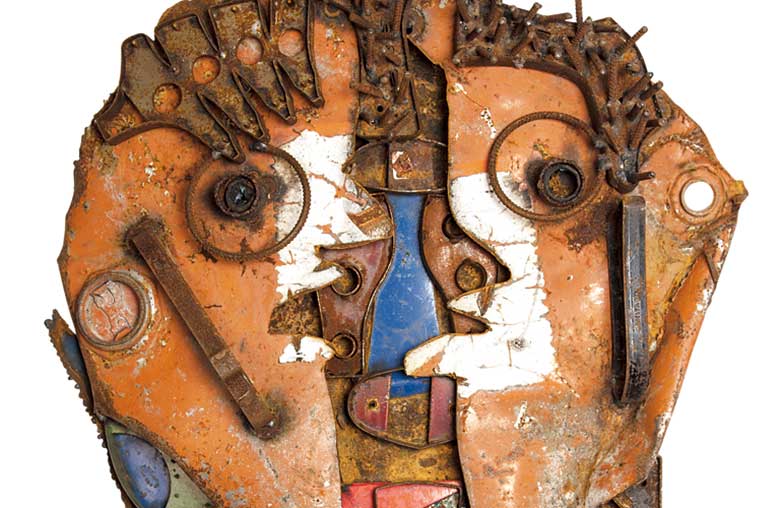About
Racism and Citizenship
The tension between racism and citizenship over more than five centuries, from 1496 to the present, is at the core of the exhibition. Visual culture ‒ paintings, sculptures, engravings, posters, ceramics, chains, manilas, books, comic books, photographs and videos ‒ is mobilised to understand historical processes of segregation of minorities in Portugal and discrimination of natives in the colonial world.
Racism (prejudices concerning ethnic descent combined with discriminatory action) was always confronted with informal forms of integration, which became predominant in the postcolonial period. The assertion of citizenship (the right to live, work and participate) followed the Revolution of April 1974 and the independence of the colonies in 1975.
During the period under consideration, Muslim expulsion took place, as did the forced conversion of Jewish people, the slave trade, the colonization of territories in Africa, America and Asia, the abolition of slavery, decolonization and immigration.
The exhibition aims to encourage the public to question past and present relations between peoples, combining emigration with immigration, exclusion and integration, lack of rights and access to citizenship.
'Exhibition documents:
Racism and Citizenship (essay)
Racism and Citizenship (flyer)
Exhibition reviews:
La Lettura, 28 May 2017 (Italian)
Expresso, 6 May 2017 (Portuguese)
Publico, 8 May 2017 (Portuguese)
Exhibition Racism and Citizenship 6th May to 3rd September 2017 Padrão dos Descobrimentos, Lisbon Curator: Francisco Bethencourt, Charles Boxer Professor, King's College London
Virtual Exhibition
RACISM AND CITIZENSHIP. OUTLINES FOR AN EXHIBITION
The exhibition displays two interlinking realities, RACISM, a prejudice relating to ethnic origin combined with discriminatory action, and CITIZENSHIP, the right to residence, work and political participation in a particular country, equally involving duties and responsibilities.
The main concern of the exhibition is the
TENSION BETWEEN EXCLUSION AND INTEGRATION.
The first part of the proposed itinerary focuses on the 16th-18th centuries, on stereotypical images of Moors and Jews, replicated once they had converted to Christianity. It then moves on to display images of enslaved populations of African origin and natives from America and Asia. This part concludes with the theory of races, that is, a hierarchical vision of the world’s peoples assuming European supremacy. The colonial world opens the second part, exhibiting images of slavery and forced work, and the dehumanisation and inferiorisation of Africans. The difficulty in the representations becomes clear, especially when confronted with the recognition of non-Christian religions. Finally, contemporary art appropriates the colonial memory and reflects on a more inclusive vision of citizenship.
A - Against Jews and Muslims
The forced conversion of Jews in 1497 triggered tensions relating to economic competition in the context of a successful integration. The converted Jews, known as New Christians, were excluded from Crown and Church institutions by the blood purity statutes, which were abolished only in 1773. The New Christians would also be the main victims of the Inquisition.
The Christian conquest of the Iberian Peninsula (from the 8th to the 15th centuries) viewed Muslims as the main enemy, a perception transported to Africa and Asia with the Portuguese expansion (15th and 18th centuries). The Muslims were expelled in 1496, but forced conversions took place. The converted were labelled Mouriscos to emphasise the infamy of their origins. Like the Jews, they were subject to the blood purity statutes.
In Portugal, legally, until the beginning of the 19th century, Jews and Muslims were only admitted for diplomatic reasons, while they were accepted in the colonies under certain restrictions.

Flagellation of Christ. Quentin Metsys (1466-1530) Museu Nacional Machado de Castro, inv.no.2518
Attributed to Júlio Dinis do Carvo, (?-1617), St James to the Moors (c. 1590), paint on wood, 169x165cm Museological Core of Sacred Art of the Museu de Mértola Câmara Municipal de Mértola
Compromisso da misericórdia de Lisboa, Lisboa: Pedro Craesbeeck (1619) paper, Folios A verso and A2, 26.3x20cm. Biblioteca Nacional de Portugal, SC7700P.
The Massacre of the new Christians in Lisbon in 1506. Van dem Christenlichen Streyt (c.1506)
Charles Delon, Relation de l'lnquisition de Goa (Paris: Daniel Hortemals, 1688), engraving of the Auto de Fé in Goa Biblioteca Nacional de Portugal, shelf-mark RES4756P
B - Slaves from Africa
The representation of Africans is initially linked to slavery and cannibalism. Images of slaves at work in the Brazilian plantations are displayed alongside images of black people in the midst of nature or of slaves as accessories of the Court. While the devil is represented by a black African in sculptures of saints, there are also examples of African saints. In a context of widespread discrimination and individual promotion of religious conversion, there is great ambiguity.
Objects such as manillas, used for the acquisition of slaves like any other merchandise, and painful, imprisoning shackles document subjected and marginalised human lives. Indeed, the punishment of slaves was only beginning to be documented by artists, who were not Portuguese but who were involved in and favourable to the movement to abolish slavery.

Ankle shackle - Acquired from António Osório de Castro, 1970 Museu Nacional de Etnologia, AB.249
Iron handcuff Museu Nacional de Arqueologia, Nº ETNO 5066; Nº ETNO 2017.1.1
Jean Baptiste Debret, Voyage pictoresque et historique au Brésil (Paris: Firmin Didot et Frère, 1834-1839), vol.2, illust.45 Biblioteca Nacional de Portugal, RES.2384 A
Jean Baptiste Debret, Voyage pictoresque et historique au Brésil (Paris: Firmin Didot et Frère, 1834-1839), vol.2, illust.29 Biblioteca Nacional de Portugal, RES.2384 A
José de Avelar Rebelo (1600 - 1657), Infante D. Afonso and a black page (c.1653), oil on canvas, 128x174cm Museu Nacional Frei Manuel do Cenáculo, inv. no. ME 1540
Unknown artist, Black woman with tray of fruit, (second half of 18th century), oil on wood, 45x33cm Museu de Artes Decorativas Portuguesas Fundação Ricardo Espírito Santo, inv. no. 586
Joaquim Leonardo da Rocha (1756-1825), Ciríaco (1787), oil on canvas, 175x125cm Museu Nacional de História Natural e da Ciência, Universidade de Lisboa, inv. no. MUHNAC-UL-22234
C - Natives of America and Asia, Europe in the centre and other racisms
Simultaneously innocent and demonic, Native Americans were seen as open to conversion but permanent wrongdoers. In Portuguese art, contradictory representations of Brazilian Indians are evident. At times, they could be portrayed as one of the Three Wise Men, and at others, as the Devil. Yet it was the relationship with cannibalism which most significantly shaped and characterised Native Americans in Europe until the 18th century.
To describe India, large European repertoires of world customs show images of human sacrifices and pagan worship of strange foreign gods.
On the basis of these negative depictions, a theory of races began to be sketched out in the 16th century, which would influence hundreds of texts, illustrations and paintings. Until the end of the 19th century, attempts were made to claim a hierarchy of races, with Europeans at the top.

Unknown artist, St Bartholomew (17th century), painted and gilded wood, 102x35cm Main Church of Idanha-a-Nova
Vasco Fernandes (1475-1542) e Francisco Henriques (? - 1518), Adoration of the Magi (1501-1506), oil on wood, 132x81x2.5cm Museu Nacional Grão Vasco, inv. no. 2145
Reproduction: Unknown artist, Hell (1505-1530)
Reproduction: Albert Eckhout (1610-1666), Tapuia woman (1641)
Jan Huygen van Linschoten (1563 - 1611), Navigatio ac Itinerarium (Hagae-Comitis: Alberti Henrici, 1599) 31,5x20,5x3,5cm, paper Biblioteca Nacional de Portugal, shelf-mark ELZ 275
Reproduction: Unknown artist (probably from the Netherlamds), The King's fountain in Alfama (c.1570-1580), oil on wood , 93x16cm. Associação de Coleção / The Berardo Collection
Unknow artist, Saint Ephigenia (18th century), Sculpture in gilded wood 112x61cm Convent of Santa Clara, Porto, inv.no.161.22.30
Photograph of Chapel of the Ancient Brotherhood of Nossa Senhora do Rosário dos Pretos, 18th century
Abraham Ortelius (1527-1598), Theatrum orbis terrarum, opus nunc denuo ab ipso auctore recognitum, multisque locis castigatum et quam plurimis novis tabulis atque commentariis auctum. - Antverpiae : apud C. Plantinum, 1579, frontispiece, 42.5x27.2cm Museu Nacional de Arte Antiga, inv. LBS Res2047
Petrus Camper (1722-1789), Dissertation physique Utrecht: B. Wild et J. Altheer, 1791, 25.3 x 21.2cm Biblioteca Nacional de Portugal, shelf-mark SA 7818 V
José María Blanco White (1775-1841), Bosquexo del comercio en esclavos y reflexiones sobre este tráfico considerado moral, politica y cristianamente.
D - The work regime in the Portuguese colonial world
In the colonies, slavery continued throughout the 19th century, and the series of abolitionist legislation from 1853 to 1875 proved to be difficult to apply. At that time, the label ‘slavery’ was replaced with that of ‘forced work’. Yet the true nature of this change of label was as unclear as it was lenient. There was a great deal of international debate on the mechanisms by which forced work was imposed. For this reason, there continued to be Africans shackled or imprisoned from the wars to occupy Africa, demonstrating the prolongation of this attitude. This is why African workers recruited for forced work continued to be documented or photographed even in the first half of the 20th century.

Engraving of a caravan of slaves in David Livingstone, (1813-1873). Narrative of an expedition to the Zambezi (London, 1865). Biblioteca Nacional de Portugal, shelf-mark H.G. 6286 V
Humbe War 1897 to 1898 (Prioners of War)
E - Contradictory realities in Portugal and its colonies
The colonial exhibitions held in the 1930s and 1940s in Porto and Lisbon followed international models of the second half of the 19th century, with the setting up of «human zoos» populated by communities brought from the colonies and exhibited in a «natural habitat» recreated for this purpose, highlighting relationships of supremacy and dependency.
Along the same lines, the eroticisation of native African women became possible in a country with supposedly strict morals, and was justified by ideas of primitivism and inferiority. Even though images of Africans assimilated into European customs and apparel acted to counter this view, racism expressed in illustrated publications, advertisements and art works was present and continued into the 1950s.
The very limited access of the native population of the colonies to citizenship status improved somewhat during the colonial war of the 1960s and the beginning of the 1970s.

Raul de Caldevilla, Advertising poster for Arêgos soap, (c. 1910-1916), 106x75cm Biblioteca Nacional de Portugal, CT.129 G. PL
Preto Papusse Papão
Casa Africana poster (20th century), 58x42cm, Biblioteca Nacional de Portugal, shelf-mark CT. 1343 A
Henrique Galvão, Album comemorativo da primeira exposição colonial portuguesa, illustrations Eduardo Malta (Porto: Litografia Nacional, 1934)
Orchestra pf "chofes", marimba players, Mozambique Portuguese Colonial Exhibition at the Palácio de Cristal, Porto, 1934 PT/CPF/ALV/013111
Simulation of an indigenous village Portuguese Colonial Exhibition at the Palácio de Cristal, Porto, 1934 PT/CPF/ALV/005053
Island of Guinea, Bijagos village Portuguese Colonial Exhibition at the Palácio de Cristal, Porto, 1934 PT/CPF/ALV/013072
Simulation of a Balanta village Portuguese Colonial Exhibition at the Palácio de Cristal, Porto, 1934 PT/CPF/ALV/005036
Cover of the Exposição do Mundo Português. Secção Colonial, preface Henrique Galvão (Lisbon, 1940)
Eduardo Malta (1900-1967), Inês, mixed-race Brazilian (1938), oil on canvas, 91.5x119cm Museu José Malhoa, Pin 260
Unknown artist, The Blacks of St George (19th century), wood, paper, fabric and glass, 245x205x140cm Museu de Lisboa /EGEAC, MC.ESC.0276
José de Moura, cover of Henrique Galvão, Antropófago (Porto: Jornal de Notícias, 1947)
Bottle Rafael Bordalo Pinheiro (1846-1905), Ceramic; 1902. Museu da Cerâmica - Caldas da Rainha, MC 206
Canteen "Belo" Avelino António Soares (1872-1927), Ceramic; 1902. Museu da Cerâmica - Caldas da Rainha, MC 208
Tobacco pouch in the shape of a black woman’s head 18th-19th century, faience from Viana do Castelo, 21.3x13x18cm, Museu Nacional de Machado de Castro, n. inv. 9435, C-892
Bottle Rafael Bordalo Pinheiro (1846-1905), Ceramic; 1902. Museu da Cerâmica - Caldas da Rainha, MC 206
F - A new vision of Africa
The constitutional monarchy (1834-1910) led the way for religious freedom with the authorisation of the return of Jewish communities and the construction of the first synagogue in Lisbon in 1904. It was not until 1985 that the first mosque to be built in the city since the Middle Ages was constructed.
The revolution of 25 April 1974 and the independence of the colonies in 1975 created the conditions for universal access to citizenship. Despite this, issues of access and discrimination continue to exist, although racism has ceased to be supported or ignored by the state. Today, racism is punishable by law.
The post-colonial period has seen significant activity by African artists, who explore their identity in a process of interrogation of institutionalised and Eurocentric images, contrasting them with the memory of different peoples. Meanwhile, Portuguese artists originating from the former colonies or who have absorbed the cultures of African populations have used these experiences to reflect on a new world, exempt from racism and with citizenship.

Synagogue of Lisbon, built in 1904, Architect Ventura Terra
Synagogue of Lisbon, built in 1904, Architect Ventura Terra
Central Mosque of Lisbon, built in 1985, Architects António Maria Braga and João Maria Conceição
Central Mosque of Lisbon, built in 1985, Architects António Maria Braga and João Maria Conceição
Vasco Araújo, Debret, 2009, Sculpture Painted wood table and egg, painted fimo figures, metal and graphite. Text: Padre António Vieira quotes
Ângela Ferreira, Pau a Pique, 2016 HD Video, 15.08, 14 images
Kiluanji Kia Henda, Padrão dos Descobrimentos, 2006 188cm x 120cm, inkjet print on cotton paper
Portuguese anti-racist law of 134/99 of 28 August
Nástio Mosquito, My African Mind, 2010 Video
Gonçalo Mabunda, Memórias, 2013 Metal and wood
Documentary
Exhibition curator Professor Francisco Bethencourt, Exhibition designer António Viana and Director of the Padrao dos Descobrimentos Margarida Kol de Carvalho discuss Racism and Citizenship.
This film is a collaboration between King’s College London’s Department of History, filmmaker Graham CopeKoga and Padrao dos Descobrimentos, supported by the Cultural Institute at King’s College London
WatchThe book that inspired the exhibition
Racisms: From the Crusades to the Twentieth Century
Racisms is the first comprehensive history of racism, from the Crusades to the twentieth century. Demonstrating that there is not one continuous tradition of racism, Francisco Bethencourt shows that racism preceded any theories of race and must be viewed within the prism and context of social hierarchies and local conditions. In this richly illustrated book, Bethencourt argues that in its various aspects, all racism has been triggered by political projects monopolizing specific economic and social resources.
Racisms focuses on the Western world, but opens comparative views on ethnic discrimination and segregation in Asia and Africa. Bethencourt looks at different forms of racism, and explores instances of enslavement, forced migration, and ethnic cleansing, while analyzing how practices of discrimination and segregation were defended.
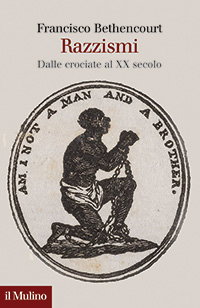 Racisms: From the Crusades to the Twentieth Century (Princeton: Princeton University Press, 2013), 444 pp. The book was translated into Portuguese: Racismos: das Cruzadas ao seculo XX, translated by Luis Oliveira Santos (Lisbon: Círculo de Leitores, 2015); the Italian translation: Razzismi. Dalle crociate al XX secolo, translated by Paola Palminiello (Bologna: Il Mulino, 2017).
Racisms: From the Crusades to the Twentieth Century (Princeton: Princeton University Press, 2013), 444 pp. The book was translated into Portuguese: Racismos: das Cruzadas ao seculo XX, translated by Luis Oliveira Santos (Lisbon: Círculo de Leitores, 2015); the Italian translation: Razzismi. Dalle crociate al XX secolo, translated by Paola Palminiello (Bologna: Il Mulino, 2017).
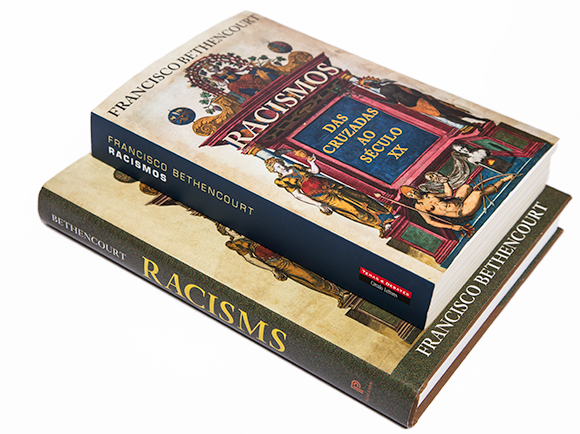
Reviews
'masterly new book [...] Bethencourt's tone in treating the crimes and follies of humankind is unfailingly cool and analytically sophisticated [...] Bethencourt's achievement is to show that racism, in all its forms, was contextual and ultimately reformable, not innate and hence inevitable [...] Bethencourt tacks deftly between cultural and social history. His binocular vision marks Racisms out from most previous studies of its subject [...] Bethencourt's long-range view - deep in time, wide in space - puts more familiar turning points in the global history of racism into novel perspective [...] more ambitiously, Bethencourt draws out racism's purpose in combating egalitarianism in Europe after 1848, in cementing racial inequality in the United States and in promoting European incursions into Asia [...] When Bethencourt reaches the past hundred years or so, the examples of the Jewish pogroms in Russia, the Armenian genocide and the Nazi racial state amply confirm his hypothesis that political projects motivate racism', David Armitage, Times Literary Supplement
'As a comparative study of colonial behaviour Racisms is astonishing... Readers of Racisms will learn a great deal about colonial encounters that brought people of different regions, religions 'skin colours' and 'ethnicities' into contact with each other during the long centuries of European expansion', David Nirenberg, Literary Review
'To understand what fuelled such racist ideologies and practices, I can think of no better book than Francisco Bethencourt's Racisms. It is an ambitious bold project... Bethencourt addresses the 'scientific' turn in racial classifications systems... Bethencourt's summary is the clearest and most sophisticated to date... [An] impressive book', Joanna Bourke, New Statesman
'Racisms cataloguing of successive centuries of poisonous bigotry, of tangled, self-serving myth and murderous victimisation, creates a powerful cumulative effect... This is an unlovely history. But a necessary one that appears, sadly for the wrong reasons, at the right time', Ekow Eshun, Independent
'Bethencourt [combines] a panoramic vision with a vertical analysis of key topics, besides presenting intriguing questions. The richness of information is formidable; the logic of the argument irreproachable', Ronaldo Vainfas, Revista Tempo (Rio de Janeiro)
'Racisms provides a sweeping history of discrimination and prejudice that links these practices to ethnic differences and political power in an elegant and learned global history of one of the world’s most persistent problems', Stuart Schwartz, New West Indian Guide
'Bethencourt's incisive analysis ought to be compulsory reading in the think tanks, chanceries and ministeries of the developed world', Maria Misra, Prospect
'this is a book that for many years will be a world reference for the study of a persistent phenomenon', António Araújo, Público (justifying why the book had been chosen as the first non-fiction book published in Portugal in 2015)
Read the full review: Publico, 18 December 2015 (Portuguese)
EXHIBITION ACKNOWLEDGEMENTS
COORDINATION
Margarida Kol de Carvalho Maria Cecília Cameira
SCIENTIFIC COMISSIONER
Francisco Bethencourt – King’s College London
ART CONCEPTION AND REALIZATION
António Viana
SCIENTIFIC-EDUCATIONAL SUPPORT
António Camões Gouveia - FCSH da UNL / CHAM
Jorge Maroco Alberto - Professor do Ensino Básico Raquel Pereira Henriques - FCSH da UNL / CHAM Serviço Educativo - Padrão dos Descobrimentos
CONSULTING
Acesso Cultura
PRESERVATION AND CONSERVATION CONSULTANT
Maria Helena Nunes – Mão de Papel
PRODUCTION ASSISTANT
Nuno Magalhães
GRAPHIC DESIGN OF EXHIBITION
Rita Cruz Neves
GRAPHIC MATERIALS
Oland - Denominação de Origem Criativa
AUDIOVISUAL PRODUCTION
Ricardo Mesquita
AUDIOVISUAL PROJECT
GMSC – Informática e Audiovisuais, Lda
EXECUTIVE ASSISTANTS
Conceição Romão Rita Lonet
CONSTRUCTION
AS Pinheiro, Lda
VINYLS AND WALLPAPER
Escarigo Factory - Centro de Produção Digital
LIGHTING PLAN
Vitor Vajão
TRANSLATION
Kennis Translations
PAST AND PRESENT
Lisbon, Ibero-American Capital of Culture 2017
AN INITIATIVE
UCCI e Câmara Municipal de Lisboa
WITH
EGEAC, DIREÇÃO MUNICIPAL DE CULTURA, SECRETARIA GERAL
MAYOR OF LISBON
Fernando Medina
CULTURE COUNCILLOR OF LISBON
Catarina Vaz Pinto
CULTURE DIRECTOR OF LISBON
Manuel Veiga
BOARD OF DIRECTORS OF EGEAC
Joana Gomes Cardoso
Lucinda Lopes
GENERAL PROGRAMME COORDINATION
António Pinto Ribeiro
9H Arquitecturas Associadas Lda. Ângela Ferreira António Viana Arquivo de Documentação Fotográfica Arquivo Histórico Militar do Exército Arquivo Municipal de Lisboa Associação de Coleções – The Berardo Collection Biblioteca Nacional de Portugal Centro Português de Fotografia Convento de Santa Clara – Porto Direção Municipal de Urbanismo - CML
Fundação PLMJ Idanha-a-Nova – Igreja Matriz Jaime Marçal João Manuel Loureiro Kiluanji Kia Henda Luís Pavão - LUPA Museu da Cerâmica – Caldas da Rainha Museu de Arte Sacra de Mértola Museu de Artes Decorativas Portuguesas Fundação Ricardo do Espírito Santo Silva Museu de Lisboa – Palácio Pimenta Museu José Malhoa – Caldas da Rainha
Museu Nacional de Arqueologia Museu Nacional de Arte Antiga Museu Nacional de Etnologia Museu Nacional de Grão Vasco - Viseu Museu Nacional de História Natural e da Ciência (MUL/MUHNAC-ULisboa) Museu Nacional de Machado de Castro - Coimbra Museu Nacional Frei Manuel do Cenáculo - Évora Nástio Mosquito Vasco Araújo
+351 213 031 950
Av. Brasília 1400-038 Lisboa
info@padraodosdescobrimentos.pt









